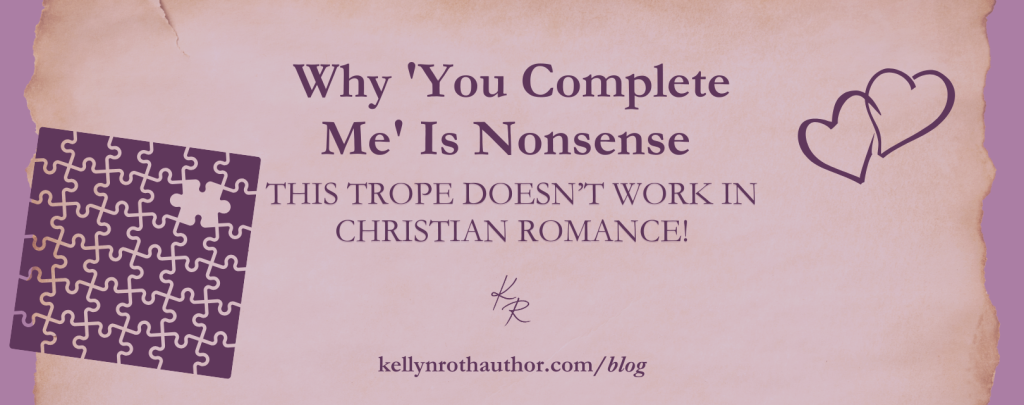Kellyn Roth here, and today I’m joined by H.S. Kylian to talk about Romance in Christian Fiction once more!
The posts in this series are as follows:
- Why Last Minute Romance Cheats Readers – Part I
- Why Last Minute Romance Cheats Readers – Part II: Myths & Facts
- Forced vs. Organic Romance
- Why ‘You Complete Me’ Is Nonsense (⇦ you are here)
- Under-Discussed Topics In Romance Novels
However, in this blog post, Hannah and I will be discussing why ‘You Complete Me’ as a concept is not founded in reality—and therefore, in the interests of truth and godliness, should not be found in Christian romance, as such.
Hannah: The only clip I have ever seen of the movie Jerry Maguire is the clip that’s shown in the The LEGO Batman movie: “You…complete me.”
It’s played as a joke both times, and honestly, that sentiment really is a joke per the Christian worldview, specifically in regards to romance. Whenever a romance book or movie has a character saying, “You complete me,” it’s not only super cheesy but also completely ridiculous. As Christians, we’re already each complete in Christ.
Though the Bible does say that ‘two shall become one flesh’, it’s not saying that as though those two are incomplete on their own as people, and it’s certainly not saying they’re incomplete on their own as Christians. They’re still each an individual.
And remember, when God created Eve, He preceded it by saying, “I will make a helper fit for him.” Not another half.
Kellyn: The thing is, I do get where this comes from. When one is in a romantic relationship, sometimes it just feels just right. Like you can’t imagine your world without that other person in it! They’re your other half—right?!
And I argue it should feel that way, somewhat. I mean, hey, you want to love your husband or wife! And you want any characters you write about or read about to reflect that love. But we must steer away from the dangerous, unbiblical idea that perfection can be achieved in another person—or at all, apart from Christ.
Further, when we write or consume stories that portray an element of perfection, of happily-ever-after that doesn’t include reality, of “completion” in another human being, we create those unrealistic expectations Christians are always so worried about.
Because no, reading well-written, realistic, godly romance does not create unrealistic expectations in young women, unless we think love is unrealistic (God might have something to say about that!). However, if we’re trying to sell readers the idea that one human being can be completed in another, well, we’re failing as authors and as Christians; we’re abusing the gift God has given us as writers and dragging our readers into a world that simply doesn’t exist.
Another thing that comes to mind when discussing this topic is the way the church deals with singleness. We kind of act like getting married is the epitome of life, don’t we?
And that bothers me, because a) the Bible encourages singleness for those who are so called, b) we don’t earn marriage by our good conduct (if that’s true, I sure shouldn’t be married!), and c) being married will not solve all your problems.
When we say or even think of concepts along the lines of “you complete me!” we are buying into that nonsense idea that marriage will solve your problems.
Well, okay, it might solve a few problems, if you’re escaping a vicious pirate and need protection or your father has once again gambled away the family fortune, leaving you with few options—but believe it or not, that just doesn’t come up too often these days. 😉 And all joking aside, if marriage solves some problems, it’s sure to create just as many.
Marriage is a blessing. It can be an incredible relationship that has so many benefits. But you have to go into it expecting to feel “iron sharpens iron” worked out in real life right before your eyes! Entering marriage with the idea that it’ll be all sunshine and daisies is going to lead to disappointment.
But entering marriage knowing it will be hard—but good and holy—is much more realistic. Of course, you don’t want to go into it thinking it’ll be so hard that your pessimism tears you to pieces—I’ve made that mistake, and I do believe in the concept of speaking life, speaking truth, and not letting the darkness drag you down into negative thoughts.
We so often hear nothing but dour warnings from our elders—and though there is truth in them, there is also another truth: even in the pain, there is so much hope and life to be found. Most squabbles over where the rubber ducks have to be stored (not speaking from personal experience; my husband and I are in 100% agreement that they deserve primary placement in our household) will be resolved sooner than you think, especially if you enter every potential conflict with a spirit of teamwork, not viewing your spouse as your enemy, but as your truest friend.
But that little sermon aside, I just wanted to say that while there is good to be found in marriage, coming at it with an attitude of “marriage will complete me” is so unhealthy and has led to so much discontent in both single and married women.
Give yourself a break; ditch that attitude.
Hannah: If you find that your characters are getting to this point, you might need to have them step back a bit. Something along those lines happened to Jonathan & Nicki prior to her leaving Marigold Hills after their high school graduation. At that point in time, they were around 18-19 and had grown closer as friends in the years since Jonathan lost his mom and brother and Nicki lost her dad (the only parent she had left).
However, this period of time also included them having a growing attraction to each other, but before any sort of admission could happen, they had begun to realize that maybe they were seeing the other as more of a crutch than an actual person. Yet instead of working things out, they basically shoved it to the side, she moved away, and though they still kept in touch, they didn’t bother touching the elephant in the room until she moved back to Marigold Hills.
Kellyn: When it comes to the actual writing of Christian romance, practically speaking, we can of course avoid using the words or portraying situations that lend to the concept of “you complete me,” but to take it a step further, what does it look like to write a romance that is free of that harmful idea—but still realistic to the “two become one flesh” concept that we Christians believe in?
Well, for one thing, we want to give our characters realistic strengths and weaknesses. We want them to have a personality and an identity apart from each other—and more than that, a relationship with Christ apart from each other.
As they develop a relationship, showing the characters continue their relationship with Christ both separately and together will also help. After all, it’s not “a cord of two strands is not quickly broken;” it’s “a cord of three strands is not quickly broken.” I’m guessing a cord of two strands is a lot easier to snap! So don’t make your characters’ relationship snappable!
But you can’t neglect any one of those cords. Including God in the relationship is important, but God never made a “love interest;” just people. Make sure both of your characters are unique, interesting, and active in the story. Particularly, female writers, don’t go writing “heroes” that are more like “wishful-thinking-fake-mirage-men-that-don’t-really-exist.” Even if you’re writing from the perspective of one character or another, make sure you develop that secondary character well.
In conclusion, “you complete me” doesn’t belong in Christian romance in any form, but there is a lot of value in showing a strong, loving marriage (or marriage-to-be) in which God is at the center, completing the couple’s covenant relationship.
TTFN!
~Kell~
Are you interested in getting to know me & my books better? Join my email list!


